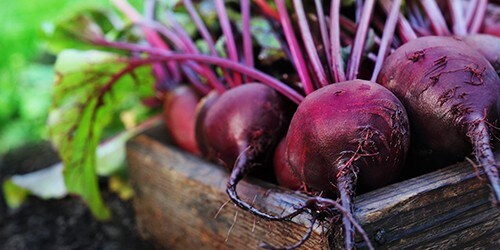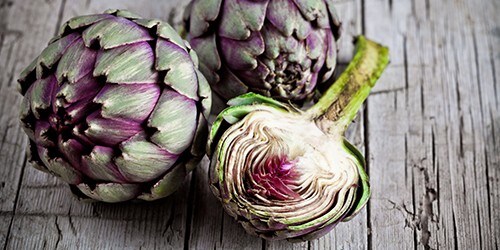
Seasonal in January
British Produce


Imported Produce


Fruit and Vegetables
Vegetables

BEETROOT:
At its best: June to October
This crunchy root vegetable is often sweet, rich, and earthy. It complements both sweet and savoury dishes and can be used fresh in a salad, roasted, or preserved through pickling. Once peeled, you can steam them whole, slice, fry, roast, or puree and cook them into a soup. Perhaps surprisingly, the green leaves of the beetroot are actually the most nutritious part of the plant - and are often overlooked and left unused. With a subtle taste that is like kale, beet greens are delicious sautéed in olive oil or balsamic vinegar for a tasty side dish. Developing a soft and sweet taste when cooked, they can even be baked to make crisps.
Chef Suggestions: Beetroot is brilliant when roasted to intensify flavour, improve texture, and increase its natural sweetness.
We recommend: Enjoy your seasonal beetroot in plant-based dishes or pickled to increase umami, kokumi and earthy notes. Equally appreciated when roasted within a salad.
Flavour profile: “Earthy and sweet”
Flavour pairings: Star anise, caper, chocolate, cucumber, cumin, dill, egg, goat’s cheese, horseradish, citrus, mackerel, and venison.

JERUSALEM ARTICHOKE:
At its best: October to March
Jerusalem artichoke is a root vegetable that resembles a ginger root and is a variety of sunflower. Not to be confused with globe artichokes, they perfectly complement red meats, fish, herbs, and spices thanks to their nutty, earthy flavour. They also pair well with citrus, particularly the grated peel. They can be eaten raw and hold up well to roasting, pan-roasting, boiling, and steaming. They have a crisp, clean flavour and have a texture much like water chestnuts.
Chef Suggestions: Tender roasted artichokes are a great way to take your salad to the next level, with bright Mediterranean flavours.
We recommend: Artichokes can be kept in oil for a convenient and quick addition to add flavour to pasta, pizza, and other Mediterranean dishes.
Flavour pairings: Butter, olive oil, olive, garlic, lemon, parsley, parmesan, thyme, Hollandaise, eggs, pasta, pizza and truffle.
Fruit

Apples:
At its best: Mainly September and October
Apples are incredibly versatile, presenting a natural freshness and combinations of sweet and sour that provide tartness and balance to various dishes. From Bramley’s to Cox’s, some varieties have floral notes, while others entice with a spicy undertone. Whether cooked or eaten raw, sweet, or savoury, apples are a versatile ingredient that can be used to add flavour and texture to a wide range of dishes.
Chef Suggestions on Apple Varieties:
- Cox’s are great for a tarte Tatin that holds up and absorbs some of that rich, buttery, caramel, and pastry, perfectly complementing its slightly spicy notes.
- Spartan are crisp, sweet and tart in equal measure, making them an ideal garnish for our plant-based oyster mushroom scallop and curried cauliflower dish. CTA to: King Oyster Mushroom "Scallops" with Cauliflower & Curry oil Recipe (unileverfoodsolutions.co.uk)
- Bramley apples are perfect for purees, pies, and crumbles.
- Apple sorbets offer a wonderful opportunity to introduce delightful contrasts in terms of flavour, mouthfeel, and temperature, cleansing and brightening the palate when paired with richer options.
We recommend: Enjoy your seasonal apples caramelised through baking or roasting, enhancing their flavour and natural sweetness. You can also try sautéing them in butter or cinnamon for an aromatic side dish, or puree them for use in baking.
Flavour profile: Sweet, crisp. Some have floral rose notes, whereby some can have spicy nutmeg and anise notes.
Flavour pairings: Traditionally, a wide range of sweet pairings includes caramel, cinnamon, honey, and vanilla, while savoury pairings shine with the addition of aromatic herbs and robust spices. Apples pair incredibly well with savoury flavours, such as pork, cheese, and spices, making them a great addition to savoury dishes like stuffing, sauces, and stews.






